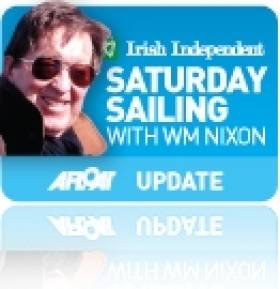Displaying items by tag: David Tucker
Irish Cruising – Sailing's Magic Elixir for a Long Life
#cruising – Cruising is the hidden side of sailing, yet it's the choice for the majority of those going afloat. Whether it's day cruising, a longer venture in the annual holidays, or the dream cruise of a lifetime across oceans, this is our sport. Unlike racing, which generates its own narrative even if only through the recorded results, much of cruising would slip under the radar completely were it not for cruising awards. W M Nixon considers the latest annual batch from the Irish Cruising Club.
Cruising under sail seems to be the secret of eternal youth. Last night's Annual General Meeting of the Irish Cruising Club in Dun Laoghaire saw a distribution of awards to voyagers from all parts of Ireland who sailed successfully in many areas of the globe in boats mostly of modest size. Yet any outside analyst would soon have made the point that many of the achievers were of mature – sometimes very mature - years, and fulfilling a retirement dream.
But despite any ICC membership gathering these days being a sea of silver heads, age is the last thing they think about. This club of 550 members has become the mixture of an Active Retirement Association – very active indeed, as it happens – and a sort of seagoing extension of the Men's Shed movement.
If you were looking for an illustration of Ireland's changing demographics, and our very rapidly changing attitude as to what constitutes old age, you need look no further than the ICC. Time was when it was thought quite something when one of the club achieved the Golden Jubilee of their membership. But these days, it's no big deal to have been on the strength for fifty years, as the senior member is Joe FitzGerald of Crosshaven, who this year marks 70 years in the club, and he is closely followed by Douglas Mellon who joined in 1947 from Howth - he now lives on the Scottish Riviera in Kircudbright.
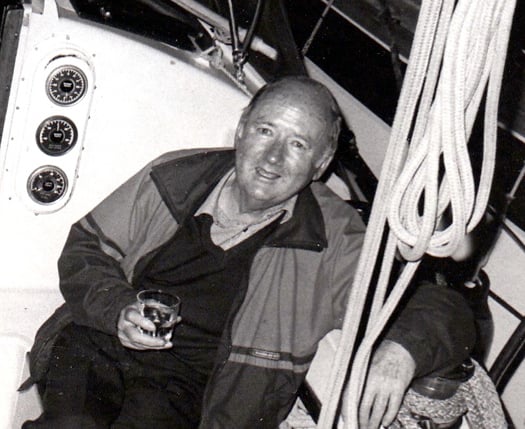
Joe FitzGerald of Cork is the ICC's most senior member, having joined in 1944. He served as Commodore from 1984 to 1987.
All those years ago when they took up their membership, it was thought perfectly normal for young men – married or otherwise - to take off for at least a fortnight's cruising every year, regardless of family demands which these days would be regarded as the prior commitment. In fact, nowadays so much emphasis is placed on family life and families doing just about every last recreational thing together, that younger married sailing people either do extremely short-hop cruising of the type necessitated by catering for the needs of all the members of the family, or else they don't cruise at all in the traditional sense - "Fun For All The Family" effectively rules out proper cruising.
Then too, modern life has so many other distractions - not least of them work demands which involve 24/7 attention - that the old-style easygoing simply-wandering-along holiday cruising is very much a minority activity. This means that at first it seems young people are not taking up traditional cruising at all. But with its deep experience garnered since its foundation in 1929, the Irish Cruising Club has learned to take the long view. It is not unduly concerned by the steadily rising age profile of its membership, and certainly every year there is a significant group of sometimes quite senior yet nevertheless increasingly active cruising enthusiasts joining the club.
They're the embodiment of the slogan that Sailing is a Sport for Life, and it's only politeness which prevents them saying that the subtle pleasures of cruising are wasted on the young. So when you look at the lineup of achievement represented by last night's awards, it's natural to wonder what these people did in earlier life, that they can nowadays afford the time, resources and dedication necessary to complete voyages of this quality.
The adjudication was done by Dave Whitehead of Kinvara on Galway Bay, himself no stranger to the ways of the sea while making long voyages in small craft. He breaks new ground by awarding three trophies at once to Sam Davis of Strangford Lough, whose Cape Horn and Pacific ventures with his Rival 41 Suvretta have been quietly bubbling away in the background of ICC activity for the past three years.
Sam Davis first featured in Afloat magazine in March and April 1981 when we ran his two-part account of his first ocean voyage, an Atlantic circuit from Strangford Lough between 1976 and 1979 with the 34.5ft West Solent Class Suvretta, a former racing boat he'd found in a derelict state and restored to ocean-going condition.
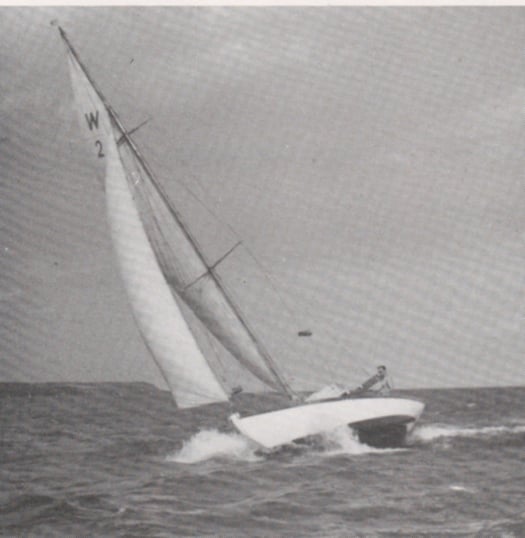
The 34ft West Solent class Suvretta in her offshore racing days in the 1950s when she was based in Belfast Lough. When Sam Davis did the Atlantic Circuit cruise with her in 1976-79, she carried a less loft mainmast, with masthead rig.
But even with Sam's improvements, she was still no more than a slip of a boat, so it says much for his grit and skill that he brought her through the Fastnet storm of 1979 as he sailed the final hundred miles back to Ireland. There was damage aloft, and he'd to get into Dunmore East unaided with jury rigging, but the job was done.
While in the Caribbean, he'd worked in charter yachts between times to make a shilling or two. But after he'd spent time back in Northern Ireland, he went abroad into serious seafaring in offshore service industries, working in places like The Gulf, the North Sea, the Amazon, the Red Sea and Malaysia, becoming a fully accredited Marine Consultant.
Yet if you ask him nowadays what he is and what he was, he'll say he's a farmer and former seaman, as his purchase some years ago of Conly Island in Strangford Lough (you can drive out to it when the tide is down) gives him the little bit of land, and an anchorage too, while "seaman" covers his many experiences in offshore work.
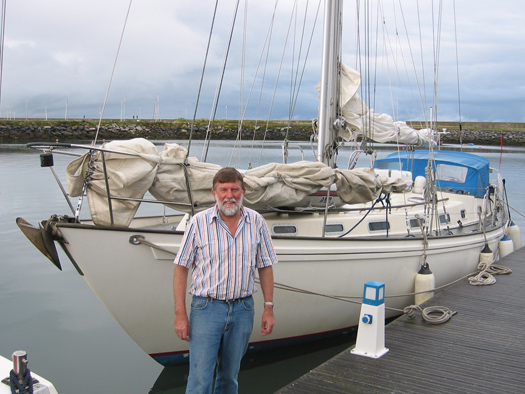
Sam Davis with his newly-acquired Rival 41, re-named Suvretta, in 2009. Photo: W M Nixon
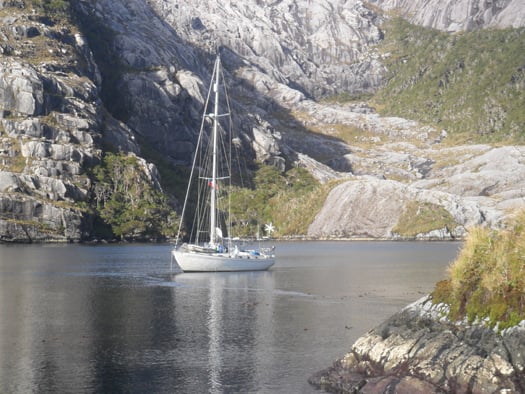
Suvretta in the Beagle Channel in southern Chile. Photo: Sam Davis
Back in 2009 he bought a Rival 41, a hefty and able vessel, a sister-ship of Waxwing in which fellow ICC members Peter and Susan Gray of Dun Laoghaire went round the world 14 years ago. Sam re-named his new boat Suvretta, spent the winter sorting her out, and in 2010 he was gone, sailing south single-handed to eventually round Cape Horn and then spend a long time on the coast of Chile. He was delayed there as a ship broke drift and damaged the boat, but it was well fixed, and he voyaged on into the Pacific to many islands, including Pitcairn and the Tahiti group.
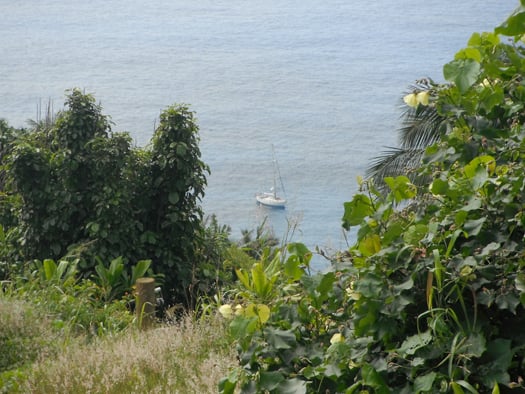
Restless anchorage. Suvretta in Bounty Bay on Pitcairn Island. Photo: Sam Davis
Eventually he fetched up for some time in Tonga, where he became enthused about the 73ft Vakas, the Pacific islanders' contemporary take on the classic Polynesian inter-island vessels (see Sailing on Saturday 11th January 2014). But by November 2012 it was time to head for home, so Suvretta sailed southeast for Cape Horn non-stop, and having rounded it, shaped her course for Port Stanley in the Falklands.
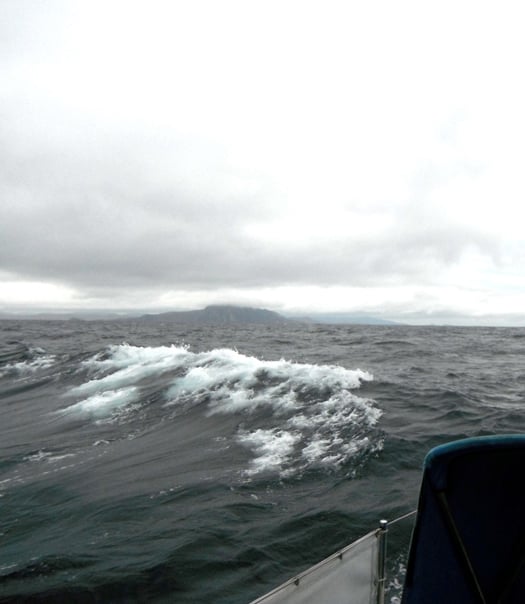
Suvretta rounding Cape Horn for the second time, 21st January 2013. It was only when the Horn was well astern that the weather deteriorated rapidly to make for a challenging approach to Port Stanley. Photo: Sam Davis
However, while rounding the Horn had been simple enough, the passage onwards to Stanley became increasingly fraught, running before rising storm force winds. Conditions were such that it looked for a while as though the lone sailor was going to be swept right past the islands, but he made the cut into shelter to such a nicety that he is awarded the ICC's Rockabill Trophy for Seamanship.
And then when Port Stanley was reached, a very fine passage had been completed from Tonga, so last night for that he was additionally awarded the ICC's Atlantic Trophy for the best voyage with a non-stop leg of more than a thousand miles. And then finally, after they'd spent the mid part of 2013 working their way up the Atlantic with the lone skipper particularly enjoying himself at ports on the Irish coast, Suvretta and Sam returned after three years to Conly Island. And they'd now done more than enough to also be awarded a third trophy - the ICC's premier honour, the Faulkner Cup.
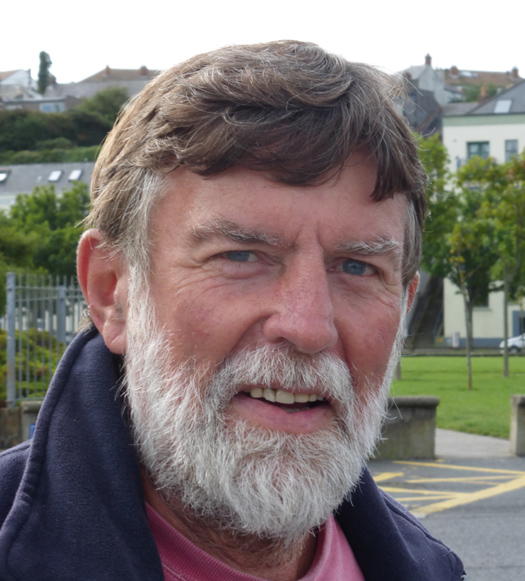
Home again. Sam Davis back in Ireland, August 2013. Photo: W M Nixon
With such a high level of activity by many members, ICC adjudicators always find some final choices to be a very close call, so some years ago the Strangford Cup was inaugurated for the cruise which almost won the Faulkner Cup. This year it has gone to a fine cruise from Portugal to Madeira and through the Azores in detail before returning to Portugal.
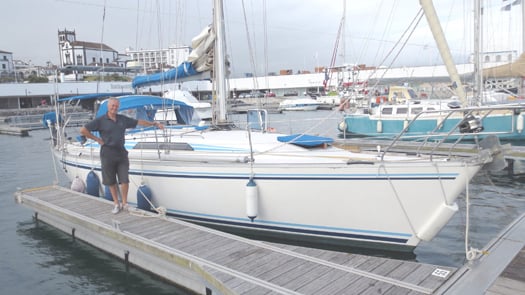
John Duggan with his MG CS40 Hecuba in Horta in the Azores
John Duggan originally hailed from Malahide where he sailed, and he also sailed with the college teams while at Trinity College in Dublin. He cruised and raced offshore mostly in the Irish Sea, but having qualified as an accountant he decided to spread his wings internationally, and he became one of those key people who turn up as partners in one of the big four accountancy firms worldwide.
Eventually his career brought him to the company's offices in Lisbon. Living in Portugal suited him fine, so he put down roots and in time bought himself an interesting cruiser. Hecuba is a 1989 Canadian-built Tony Castro-designed MG CS40, a handsome 12m craft with good performance enhanced by an effective wing keel.
During his final years in the day job he gradually improved the boat with a mind to some proper cruising once he retired at 60, something which he planned with all a high-powered accountant's meticulous attention to detail. He remembers the final day at the office, when a friend on the other side of the world sent him an email: "Even the worst day of your retirement will be better than the best day at work".
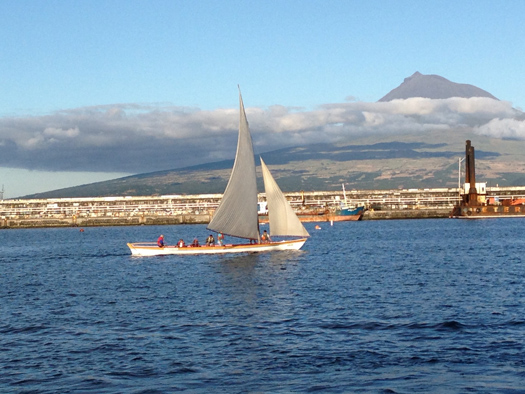
Azorean whaleboat with Pico beyond seen during one of Hecuba's cruises from Portugal to the Azores. Photo: John Duggan
Maybe so, yet not everyone makes the changeover smoothly, but in John Duggan's case the challenge of planning and executing remarkably civilised yet challenging cruises has proven to be a complete new job in itself, but much more fun than number crunching. He goes to enormous trouble to make sure that his crews have as enjoyable and varied an experience as possible, yet all the time he is quietly keeping the project moving along while noting details and features of ports visited which might be of interest to fellow skippers, a habit which is the hallmark of the true cruising man.
When you live in Cascais with your boat based in the marina nearby, the Azores are the western isles which call you each summer. But unlike Scotland's Western Isles which are just a day's sail away across the Sea of the Hebrides, the Azores involve an immediate ocean voyage from Portugal of at least 500 miles. However, for 2013's cruise west, Hecuba made it a triangle, going first to Madeira before going on nor'west to the Azores which were cruised in detail before returning to Cascais after six weeks away, having logged 2390 miles, with the final tabulation being:
Hours spent close hauled: Zero.
Cross words exchanged: Zero.
Inevitably the two big awards dominate the scoresheet, but the ICC also has a host of trophies which reflect every level of club sailing activity. The Round Ireland Cup, for instance, is for the circuit which produces most information for the club's sailing directions, and in a year in which a goodly number went round, it was Donal Walsh of Dungarvan with his Moody 31 Lady Kate who best filled the bill.
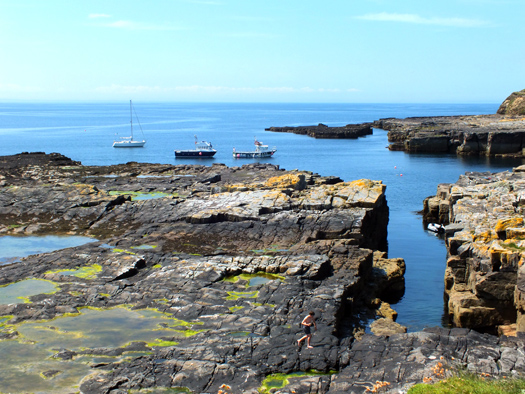
Donal Walsh's Lady Kate anchored at Inishmurray off the Sligo coast during his detailed round Ireland cruise. Photo: Donal Walsh
As the Faulkner Cup was first won in 1931 by the 28ft cutter Marie, the Marie Trophy is for the best cruise by a boat under 30ft, and Mick Delap from Valentia Island with his Tamarisk 24 gaff cutter North Star fits into the size requirement with six feet to spare. He made a fine job of completing a two-summer circuit of Ireland by returning from western Scotland via the Irish Sea and Ireland's south and southwest coasts.
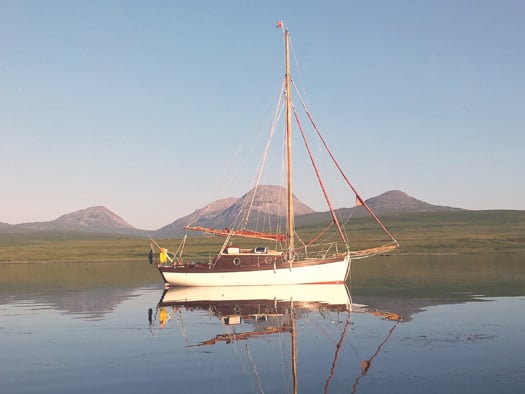
Mick Delap's Tamarisk 24 North Star from Valentia in Lowlandman's Bay in Jura in the Hebrides. Photo: Mick Delap
In all, the ICC has a dozen cruising trophies. But even so not everyone gets one in a typically busy year, so to encourage the newcomers they've the Perry Greer Trophy for first time log-writers, and it goes to Peter Mullan from the Quoile in Strangford Lough for his insightful account of a round Ireland cruise with the Jeanneau Sun Odyssey Sancerre.
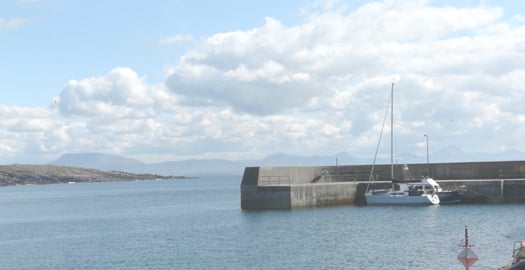
Peter Mullan's Sun Odyssey Sancerre in the little harbour at Tory Island with the Donegal highlands beyond. Photo: Peter Mullan
All the logs, including the winning ones, were featured in the ICC's 180-page Annual 2013, which Honorary Editor Ed Wheeler managed to get to the members in time for Christmas. All this is done by voluntary effort, yet the Annual would stand up to professional comparisons, as it includes informative accounts of cruises in just about every part of the world, plus a report on the ICC Cruise-in-Company to the Isles of Scilly which was an outstanding success despite coinciding with some uneven weather in June.
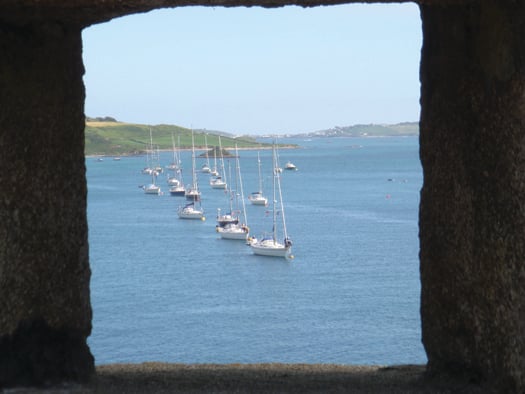
The Irish Cruising Club flotilla in the Isles of Scilly during their successful Cruise-in-Company in June 2013.
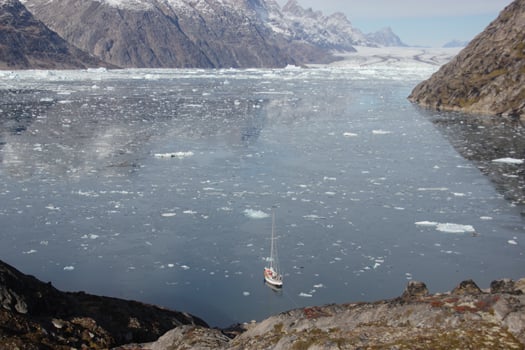
Everyone to his taste. ICC member Brian Black went to Greenland for the sixth time, crewing on Aurora. This is Kangertitiatsivaq Fjord in high summer. Photo: Brian Black
There's more to the Club than the Annual, as the ICC's programme of producing constantly up-dated Sailing Directions for the entire Irish coast in two volumes is a continuous progression, with the latest 12th Edition of the North & East Coast Book due next month from Honorary Editor Norman Kean, whose home port is Courtmacsherry.
Thus it's clear that Ireland's cruising club is a truly all-Ireland organisation, and this year it will be celebrating its 85th birthday with a Cruise-in-Company to Glengarriff where it was founded on July 13th 1929. Yet despite its obvious significance, this is a club without premises. In the final analysis, it's a club of the mind, made up of kindred spirits. Heading such a body is a mighty challenge, and the changing of the watch is always a charged moment.
Last night David Tucker of Kinsale stood down after serving his three years as Commodore, and he was succeeded by Peter Killen of Malahide. His experience in club administration is long-lived – he was Commodore of Malahide YC when it became "Club of the Year" in 1980. But it was his cruising CV which next went into overdrive, as in 1993 he voyaged north to Iceland, circled it, and then sailed back in near-record time in an S&S 30. He then moved up to a Sigma 36 which he cruised to Greenland among other places, following which he cruised even further with a Sweden 38, and then in 2004 he took on his dreamship, the Amel Maramu 54 Pure Magic.
Peter Killen seems to have cruised this very special boat just about everywhere. Not least was deep into Antarctica, where he made a memorable arrival in zero visibility with icy conditions into the natural harbour in the extinct volcanic crater on Deception Island. It was all a long way in time and distance from five boats gathered in Glengarrif in the hope of forming a little cruising organisation back in 1929. But that's the way it is with the Irish Cruising Club.



























